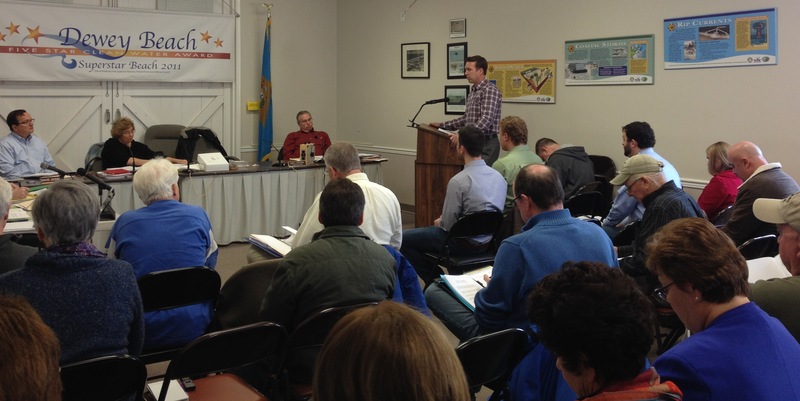Dewey council approves brewpub

Let the beer brewing in Dewey begin.
By a vote of 3-1, Dewey Beach Town Council approved the conditional-use permit for a new gourmet farm-to-table restaurant with a beer brewing component during a public hearing held March 8.
The Dewey Beer and Food Company will be located in the former Bubba’s Grill facility at 2100 Coastal Highway.
Councilman Gary Mauler was the lone vote of dissent, and Councilwoman Anna Legates did not participate in the public hearing or vote afterward because of a conflict of interest.
The favorable vote comes nearly a full year after applicants Brandon Smith, Clinton Bunting and Mike Reilly went before the council in June 2013 seeking a conditional-use permit for the creation of a microbrewery. That application was voted down, and the men came back in January with an application that put food first and beer second.
“It's exciting to think that we can start getting the real work done,” said Reilly, who will be the head brewmaster.
Smith said at the beginning of the process there was a passion about beer, and now there's a passion about food and beer. Bill Clifton, Henlopen City Oyster House executive chef, was introduced as head chef of the restaurant portion of the business.
The seating capacity at the restaurant will remain at 110, but the dining area will be expanded by 190 square feet. About 750 square feet of the building will be dedicated to the brewing area, which will use a seven-barrel brewing system.
As part of the permit, and in addition to the conditions put in place by the town's planning commission, there were a number of conditions added by council including that patrons must be out of the restaurant by 11:30 p.m., delivery trucks will not be able to turn around at the end of Saulsbury Street, and patrons as well as employees will be allowed to use the bathroom in the southern portion of the property.
Mayor Diane Hanson said she entered the process against the idea of the microbrewery, but the applicants worked with the town and did a good job of alleviating her concerns. She recognized that a vote in favor of the brewpub would alienate some of her voters.
“I'm putting my trust in the applicants that they'll make this a family-friendly environment. It may be the end of my political career, but I'm willing to put this on the line,” she said. “I think we are headed in the right direction.”
A number of individuals spoke out against the brewpub, including Jane R. Patchell, an attorney for the Georgetown-based law firm Murray Law LLC. She read into the record a seven-page document that represented the feelings of nearly 20 property owners.
Patchell cited concerns over discrepancies between town code and manufacturing, the location of the brewpub with the residential neighborhood immediately to the east, the potential hazards associated with the brewing process and the fact that the applicants never got a certified engineering plan.
“For all the reasons I have stated, you should vote to deny the conditional use application of Dewey Beer & Food Company,” she said. “This application fails on many levels comply with that code. Therefore, the application should be denied, and the ordinance should not pass.”
Following the vote, Dewey resident Elissa Feldman, who was one of the residents presented by Patchell, sent an email response that represented the thoughts of the Citizens to Preserve Dewey contingent, who identify themselves as a volunteer group of Dewey Beach property owners.
“The Dewey Beach Town Council ignored town law in approving the brewpub today. There is no approved manufacturing use in Dewey, and the state defines a brewpub as manufacturing beer. We are greatly disappointed in these public officials who chose not to uphold the zoning law of the town,” Feldman wrote.
Bunting wasn't pleased with the citizen group's action throughout the process.
“I'm disappointed with the CPD. They made gross and inaccurate statements to try and not get this business in town,” he said.
Reilly added that what the brewpub was after was being a friendly neighbor.
The applicants still have to get the required permit from the state’s Alcohol Beverage Control Commission, which Bunting said should take between 45 and 70 days.
Chris Flood has been working for the Cape Gazette since early 2014. He currently covers Rehoboth Beach and Henlopen Acres, but has also covered Dewey Beach and the state government. He covers environmental stories, business stories and random stories on subjects he finds interesting, and he also writes a column called Choppin’ Wood that runs every other week. He’s a graduate of the University of Maine and the Landing School of Boat Building & Design.
























































